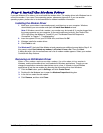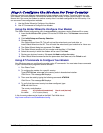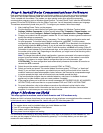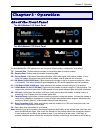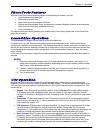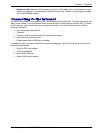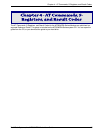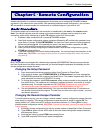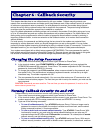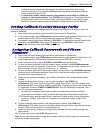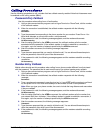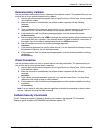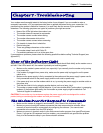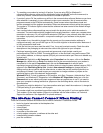
Chapter 6 - Callback Security
Multi-Tech Systems, Inc. MT5634ZBA-Series User Guide 20
Chapter 6 - Callback Security
This chapter describes how to use callback security with your modem. Callback security protects your
network from unauthorized access and helps control long-distance costs. When callback security is enabled,
all callers are requested to enter a password. If a valid password is received, the modem hangs up and
returns the call by dialing a phone number that is stored with the password. The person being called back
must then enter the password a second time to establish a connection.
Up to 30 callback passwords and dialing strings can be stored in the modem. Each dialing string can be up
to 34 or 35 characters long and can contain commands as well as phone numbers. For mobile callers, the
dialing string can be programmed to allow the caller to bypass the stored callback number by entering a
temporary callback number, to enter an extension at the callback number, or to make a direct connection
without callback.
For local security, the passwords and dialing strings that are stored in the modem are protected from
tampering by a setup password, which you should change when you set up the modem. You can further
protect the modem against tampering by disabling its ability to respond to most AT commands. To check for
attempted break-ins, you can request the modem to display the number of failed password attempts.
Your modem was shipped with a default setup password (MTSMODEM). The same password is used for
both callback security and remote configuration (Chapter 5). Because anyone who has access to this guide
has access to the default password, you should change the password during your initial setup.
Changing the Setup Password
1. Open a data communications program such as HyperTerminal or PhoneTools.
2. In the terminal window, type AT#SMTSMODEM (or AT#Sxxxxxxxx if you have replaced the
MTSMODEM password with xxxxxxxx). Press E
NTER. The modem responds with OK if the setup
password is correct and ERROR if it is wrong.
3.
To change the password, type AT#S=xxxxxxxx, where xxxxxxxx stands for the password, and
then press E
NTER. The password can include any keyboard character, and can be up to eight
characters long. The modem responds with OK.
4.
The new password is saved automatically. You can now either enter more AT commands or exit
the data communications program. The next time you wish to set up the modem, you must use the
new password.
CAUTION: Passwords are case-sensitive. The next time you enter the password, it must be in the
same case as you set it up.
Turning Callback Security On and Off
Callback security must be turned on to enter many callback security commands.
1.
Open a data communications program such as HyperTerminal or PhoneTools.
2.
In the terminal window, type AT#Sxxxxxxxx, where xxxxxxxx is your password. Press ENTER. The
modem responds with OK if the setup password is correct and ERROR if it is wrong.
3.
Type one of the following commands:
· To turn off callback security: Type AT#CBS0 and press ENTER. Callers no longer need a
password to connect to the modem, the modem is unable to call them back, and the stored
dialing command locations 0–3 become available.
· To turn on both local and remote callback security: Type AT#CBS1. Press ENTER. With
local security turned on, you must enter the setup password before you can enter any AT
command except the AT, ATIn, and AT#Sxxxxxxxx commands. For a description of remote
callback security, see the following paragraph.
· To turn on remote callback security only: Type AT#CBS2 and press ENTER. With remote
callback security turned on, each caller is asked to enter a password, is called back, and then



